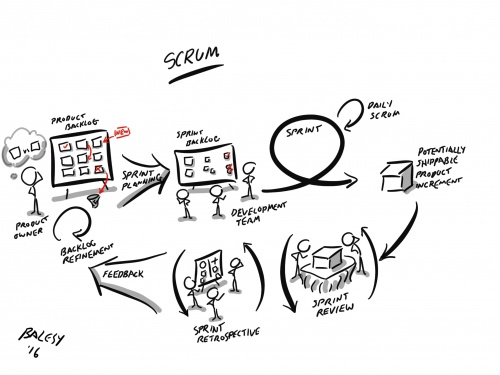Scrum Framework: Difference between revisions
Jump to navigation
Jump to search
No edit summary |
No edit summary |
||
| Line 1: | Line 1: | ||
[[Category:Agile:Articles]][[Category:Agile]][[Category:Scrum]] | [[Category:Agile:Articles]][[Category:Agile]][[Category:Scrum]] | ||
The Scrum framework was first presented by Ken Schwaber and Jeff Sutherland at the OOPSLA conference in 1995. The definition for the framework and the underlying source is the [http://scrumguides.org The Scrum Guide] which is periodically updated. | The Scrum framework is currently the most widely known and used agile framework in the world, and was first presented by Ken Schwaber and Jeff Sutherland at the OOPSLA conference in 1995. The definition for the framework and the underlying source is the [http://scrumguides.org The Scrum Guide] which is periodically updated and is a concise guide of the components and how scrum works. | ||
Scrum is quite simple to understand, but also difficult to master and put into practice especially if the environment has been conditioned with traditional project delivery approaches such as Waterfall for example. | |||
The components of scrum include the events, roles and artefacts, and there is an underlying theory to the framework, which are described in more detail below. | |||
[[File:Scrum.jpg|500px|Scrum Framework]] | [[File:Scrum.jpg|500px|Scrum Framework]] | ||
| Line 16: | Line 20: | ||
==Scrum Artefacts== | ==Scrum Artefacts== | ||
* [[Scrum Artefacts]] | * [[Scrum Artefacts]] | ||
==Scrum Theory== | |||
* [[Empirical vs. Predictive Control]] | |||
* [[Sprints]] | |||
==See Also== | ==See Also== | ||
Revision as of 01:06, 23 November 2018
The Scrum framework is currently the most widely known and used agile framework in the world, and was first presented by Ken Schwaber and Jeff Sutherland at the OOPSLA conference in 1995. The definition for the framework and the underlying source is the The Scrum Guide which is periodically updated and is a concise guide of the components and how scrum works.
Scrum is quite simple to understand, but also difficult to master and put into practice especially if the environment has been conditioned with traditional project delivery approaches such as Waterfall for example.
The components of scrum include the events, roles and artefacts, and there is an underlying theory to the framework, which are described in more detail below.
